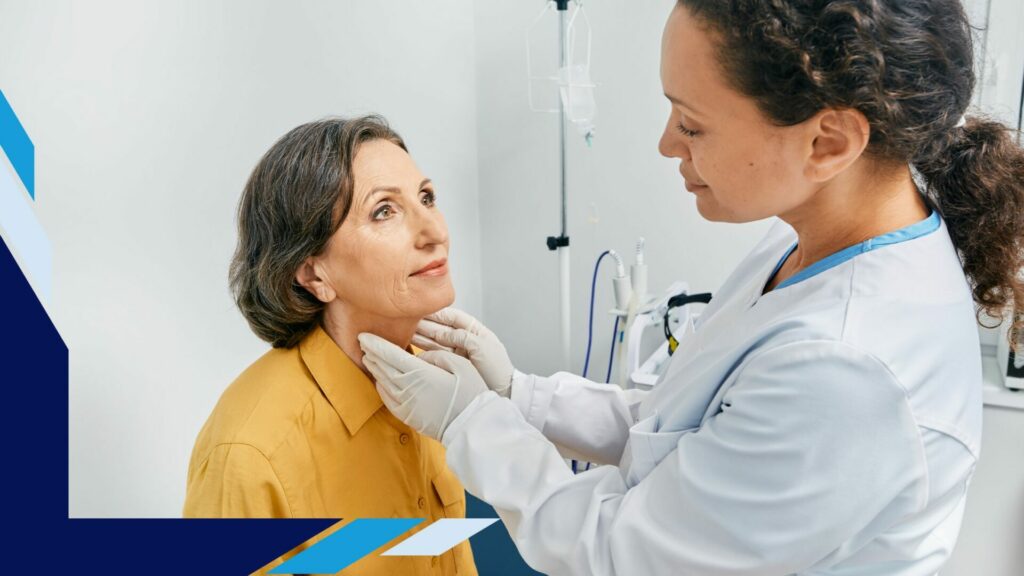
Thyroid disease is much more likely to occur among women than men. One in eight women experiences some form of thyroid disease, which can be classified as either hyperthyroidism or hypothyroidism. This week on Fox 17, Dr.Bitner discusses the importance of the Thyroid gland and the difference between Hyperthyroid and Hypothyroid disease.
The Thyroid is a gland located in the neck that releases the two hormones, thyroxine (T-4) and triiodothyronine (T-3). These hormones affect every cell in the body. T-4 enters our blood from the Thyroid and is converted by the cells to T-3, which provides support for the function of every cell and organ. Thyroid disease is either the overproduction or lack of production of these hormones, directly impacting energy levels, the immune system, metabolism, and many other functions.
Hypothyroid disease is caused by having low levels of T4 or T3, resulting in our cells not getting the support they need. In other words, this disease can make individuals feel sluggish. Symptoms include heavy periods, weight gain, cold intolerance, slow heart rate, exercise intolerance, depressed mood, and dry skin.
The risk factors for Hypothyroid disease are:
Treatment for Hypothyroid disease depends on the cause. The first step in treatment is understanding why the thyroid is not performing properly through various checks and tests. Women have found relief by taking iodine vitamins to support thyroid function or a thyroid hormone medication that helps restore the production of T3 and T4.
Hyperthyroid disease is caused by having excessive levels of T4 or T3, resulting in our bodies feeling like we are in high gear all the time. These symptoms include oily skin, hyperactivity, symptoms of anxiety, weight loss, being overly sensitive to heat, and lack of periods.
The risk factors for Hyperthyroid disease are:
Treatment for Hyperthyroid depends on the cause. Again, treatment begins with understanding why the thyroid is overproducing hormones. Then, your doctor and you can determine if medication to suppress thyroid function, radioactive iodine, or surgery to remove your thyroid gland is right for you.
Jane, 42, was feeling more tired than usual and was gaining weight. She thought it might just be because she is a busy mom but was unsure, so she decided to ask her doctor about it. Her doctor informed her that these symptoms could be related to hormone production in her thyroid. Because Thyroid disease is common among women, Jane’s doctor ordered blood work and other tests to determine the function of the Thyroid gland.
The test results showed Jane had low T4 and T3 and elevated levels of TSH and TPO, suggesting the cause could be the autoimmune disease, Hashimoto Thyroiditis. They also reviewed Jane’s diet, finding that it did include a sufficient amount of iodine. Based on these findings, her doctor determined that Jane had Hypothyroid disease caused by Hashimoto Thyroiditis. Jane’s treatment included thyroid support vitamins along with Synthroid, a hormone medication aimed at boosting T4 production.
After two months, Jane got her hormone levels checked. The test found that her T4 level had increased, but her T3 level had not. This meant she would also need to take a medication for T3, known as Cytomel thyroid medication. Finally, after three months, she was starting to feel better. She noticed her brain fog was gone, and her body was again energized and beginning to feel normal. Her doctor advised her it would take an additional three months of her levels being regulated before she would expect to feel completely normal.
Jane felt relieved that she had spoken to her doctor and understood that it would still be some time before she felt completely like herself again. Despite this, she held onto hope that she would overcome her thyroid disease and reclaim her health.
Get ahead of Thyroid disease by knowing your risk and getting regular thyroid screenings. If you’re currently on medication but still experiencing symptoms, it’s crucial to discuss with your doctor the possibility of checking your T3 levels.
Watch the full segment here.

OUR PROGRAMS
RESOURCES
CONTACT US
SUBSCRIBE